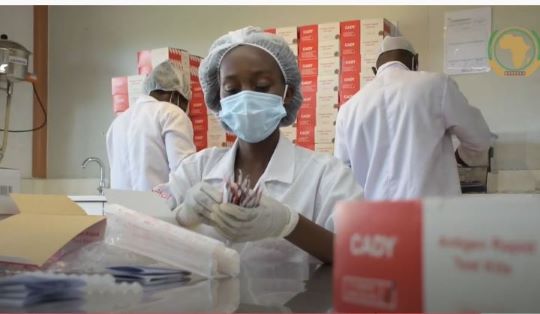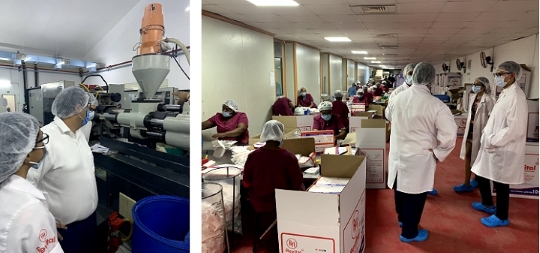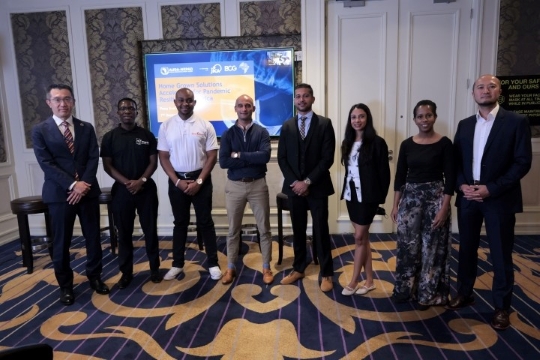Developing resilient healthcare systems with African products and services: Supporting local companies to tackle their own challenges
2022.03.18
“As the COVID-19 virus spreads throughout the world and countries are being driven to respond to their own situation, Africa, which highly relies on imports for Personal Protective Equipment (PPE) and other medical supplies, was left behind and became increasingly isolated. The idea behind this program stemmed from the growing momentum in Africa that they had to do something about the situation on their own rather than relying on other countries. As various private companies in Africa were creating local solutions, we asked ourselves if we could support their growth.”
The Home Grown Solutions (HGS) Accelerator is now underway in collaboration between JICA and the African Union Development Agency (AUDA-NEPAD). It is a program to support African companies that aim to address healthcare issues with home-grown products and services, leveraging the COVID-19 pandemic as an opportunity. OIKAWA Takeshi of Boston Consulting Group, who is in charge of the operation of the HGS Accelerator as a project leader, explains above regarding how the program was conceived.
It is vital to strengthen one's own healthcare system in order to effectively respond to crises such as the COVID-19 pandemic. In this article, we will take a close look at the activities of this program, which supports local companies striving to improve healthcare systems in Africa.

Aiming to strengthen African healthcare systems with locally manufactured products
(Revital Healthcare’s manufacturing facility that produces medical supplies in Kenya. Image captured from the company's video introducing the project: https://www.youtube.com/watch?v=3FqIGVuUvsM)
When COVID-19 began to spread in April 2020, JICA and AUDA-NEPAD paid close attention to the activities of local private sector players in the healthcare sector, which were resiliently seeking solutions to the crisis of Africa's isolation. These companies, however, faced various challenges to their growth, such as the lack of advice on business management and access to finance. In order to accelerate their growth, the HGS Accelerator was developed for the pilot phase in East African region, with details finalized in October and applications from companies swiftly started in December.
Mr. Oikawa describes the characteristics of this program as follows.
“What makes this project different from other business-supported initiatives is firstly its focus on the healthcare sector. Secondly, the program is not limited to startups but also for family businesses that have been in existence for generations, as well as small and medium-sized enterprises with innovative solutions. Another feature worth noting is that this program is fully owned and led by AUDA-NEPAD, which has a very close relationship with African governments (member states of the African Union). The healthcare sector is typically highly regulated by governments in terms of approval, registration and monitoring of the products and services, so it is critical for government agencies to provide strong support to companies. Furthermore, the support for each company is completely tailor-made. Rather than just offering ready-made services, our management consultants will thoroughly discuss with the companies what their challenges are and what they need to do to expand their business, and jointly create a specific acceleration plan.”
From the perspective of their potential impact on the healthcare sector and their medium to long-term business viability, five companies were selected from 56 applicants for the program. During the six months of intensive acceleration support that began in April 2021, each of the five companies demonstrated stronger growth than initially expected.
“Revital Healthcare (EPZ) Limited, a manufacturer of essential medical supplies such as syringes in Kenya, was struggling to raise funds to expand its business. We discussed with them in detail how they can attractively market themselves to investors, and subsequently, they managed to raise funds worth 700 million yen from private investors and foundations. Consequently, they were able to expand their production line and increase the manufacturing of syringes by about 3.5 times, as well as enhance exports outside of Africa.”

The project team visiting the production factory of Revital Healthcare (Kenya). While observing the conditions at the production site, the team discusses with the management in detail how to expand the business
Mr. Oikawa said that while the program succeeded in reaching its original goal, which was to accelerate the growth of companies, he also felt the strong passion of the local companies themselves to improve the dire situation on the ground for many people in Africa.
“As a management consultant, we tend to suggest business models that are likely to be more profitable. However, the CEO of M-SCAN, which provides mobile ultrasound services to pregnant mothers in rural areas with no medical facilities in Uganda, had a clear philosophy for his business. Targeting customers in urban areas might be better for the financial success of the company in short-term but he was determined to prioritize customers in rural areas. He is an ultrasonologist himself, and he had witnessed the limited access to healthcare in rural areas. He was filled with an unwavering determination to take on these problems, which opened up my eyes.”
In 2022, the program will be expanded to cover the entire continent of Africa. 160 companies from 25 countries have already applied (February 7 was the application deadline), and about 15 companies will be selected by the end of March. The six-month management support program will start in April.

A press event was held in Kenya in December 2021 to promote the 2022 program, with executives from companies participating in the 2021 program. Mr. Oikawa is on the far right
“I am confident that AUDA-NEPAD will successfully drive this program this year too in partnership with JICA and other partner organizations. It is really commendable that an African organization like AUDA-NEPAD is supporting Africa entrepreneurs who are determined to solve challenging problems in healthcare sector,” said Mr. Oikawa.
The AUDA-NEPAD team has witnessed the tangible impact of this program through the pilot phase and the senior management team, including Dr. Ibrahim Assane Mayaki, CEO of the agency, is highly motivated to drive this program to an even more successful state.
As the program continues year after year, a network will be established among the companies that received support from this accelerator. It is expected that business collaboration is promoted among them for a greater impact for strengthening the healthcare system in Africa.
“When Africa and Japan are working together for co-creating solutions for various challenges, it is critical to involve innovative private sector players in Africa. I think it is important for JICA to play a role as a catalyst to link innovative local companies tackling social issues with nation-building. At TICAD8 (The Eighth Tokyo International Conference on African Development), which is scheduled to be held in Tunisia this year, I would like to see stronger involvement of private sector players in Africa, as well as Japanese government’s commitment to support them,” says Mr. Oikawa.
Mr. Oikawa is himself a former JICA staff member. After working in the Tanzania Office, he became a management consultant. He is currently based in Kenya and supports the growth of African companies from the perspective of both the public and private sectors.
scroll